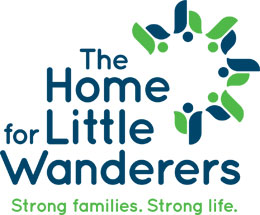|
A BRAND New Day for The Home for Little Wanderers Agency unveils new look 
Today marks the start of a “brand” new day for The Home for Little Wanderers (The Home), as the oldest child and family services agency in the nation unveils a new brand identity. For more than 200 years, The Home has earned a reputation for doing whatever it takes to strengthen vulnerable families and keep children safe in their own communities, even when they don’t have family support. In an effort to provide a clearer representation of the seamless continuum of services that The Home provides for every stage of child and family development, the non-profit agency partnered with leading branding agency Corey McPherson Nash (COREY) to evaluate its brand strategy and create a new logo and messaging. “By launching a new look, we hope to strengthen the story behind the name as we move into The Home’s third century,” said Joan Wallace-Benjamin, President and CEO, The Home for Little Wanderers. “We are increasing the focus of the work we do with families and not just the individual child.” The redesigned logo features a series of repeated shapes representing support for the child, family and community. The circular design wraps around The Home for Little Wanderers’ name, symbolizing growth and a sense of security while depicting a strong and competent organization. “The goal is to easily understand the distinction and impact of a brand so it can be fully appreciated and supported. The astonishing level of programs, services and overall leadership made it easy to capture the heart of The Home’s brand,” explained Christine Klaehn, COREY’s Partner and VP of Brand Strategy. “The result: ‘Strong Families. Strong Life’ is the platform that allows The Home to communicate its vision and excellent work.” According to Wallace-Benjamin, “Our research found that there was enormous brand equity in The Home for Little Wanderers’ name, yet many New Englanders did not understand what we do. With a strong history dating back to the founding of an orphanage, many people were unaware that today, The Home provides services to children aged birth to 21 and we are not just a single place. In addition to multiple program sites, our staff of more than 600 is providing services in schools, homes, and throughout the community.” The launch of The Home’s new brand is happening at a very exciting time as the agency is shifting operations of its landmark Knight Children’s Center in Jamaica Plain to a renovated campus at its Longview Farm facility in Walpole, including a state-of-the art special education center and new residences. Additionally, the agency is expanding its community-based programs across Boston and Eastern Massachusetts. With a clinical presence in more than 40 schools, The Home is the largest provider of behavioral health services for the Boston Public School System. In July, The Home opened Roxbury Village, an innovative new program for transitional aged youth (18-22) who were at risk for homelessness after aging out of state systems of care. By developing innovative and unique programming, The Home is committed to meeting the needs of underserved populations. “For many young people in our care who do not have a family, we work with them to build other types of connections,” said Wallace-Benjamin. “Today, we are providing them with the tools they need to thrive, succeed and develop their own ‘strong life.’ We never give up on children and we don’t let the children give up on themselves.” About The Home for Little Wanderers
|
|
|